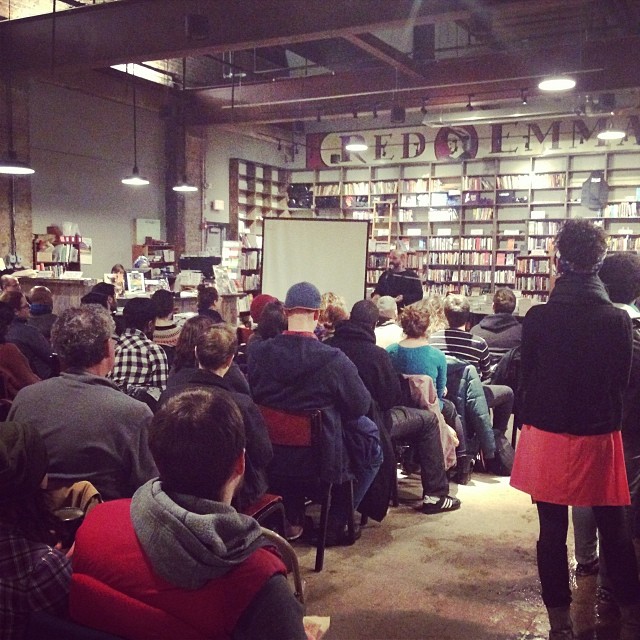Brittany Oliver, Baltimore, MD, USA, SSH Blog Correspondent

Last week, Egyptian feminist Nana Elhariry and DC-based Arab/Muslim writer Rami el-Amin shared their personal reflections at the event “The Egyptian Revolution: It’s Context, the Feminist Movement, and the 3 Years Since,” held at Red Emma’s Bookstore and Coffeehouse in Baltimore, MD.
Both women were distinctively able to recall instances of street harassment they witnessed during the movement. They mentioned that women were subjected to vulgar remarks, insults, indecent exposure, stalking and fondling despite advocating for the same issues among their male counterparts. I attended because I wanted to learn about the experiences women faced during the Egyptian Revolution and, aside from reading about it, I wanted to have a face-to-face discussion about it. Their mentions of street harassment definitely hit home for me.
The reason why I connected with these instances so much is because I’ve experienced street harassment myself and I know others who have as well, but who are afraid to speak out about it. Because these acts are very likely to happen if you are a woman, walking along the streets of Baltimore at certain times can get very scary. And with the countless number of stories, reports and facts, you would have to wonder – what exactly is Baltimore doing about it?
According to Stop Street Harassment, studies around the world show that 80 to 100 percent of women experience street harassment. In a study of 811 women from 23 countries, almost one in four had experienced street harassment by age 12 (22%) and nearly 90% by age 19. So, there should never ever be an issue on whether or not street harassment is a current form of gender-based violence because the research and facts are there. It’s an issue that more people need to be educated on because not only is it rarely reported, but also the least legislated against.
So what IS being done? Aside from Stop Street Harassment, Hollaback! Baltimore is a local movement of activists who are making some serious moves to ending street harassment within the area. Just this week, Hollaback! Baltimore hosted a Street Harassment 101 workshop for the volunteers of Repair the World, which was intended to help them become better allies to the movement.
One of the best ways to stop street harassment is by educating as many people as we can on ways to better interact with women and LGBT individuals in our communities. As Baltimore ranks as the seventh most dangerous city in the country, I still believe there are a lot of actions we can take to make it a better place to live. We may not be able to change it all at once, but every bit of work towards making our streets safer will help make a difference for the future.
March 30th to April 5th will be the 3rd annual of International Anti-Street Harassment Week and I’m looking forward to seeing what activists in Baltimore will do in continuing the fight.
Brittany Oliver is a recent graduate of Towson University and works in the non-profit communications sector and supports local anti-street harassment advocacy through Hollaback! Baltimore. She blogs at brittuniverse.wordpress.com and publicly rants on Twitter, @btiara3.

